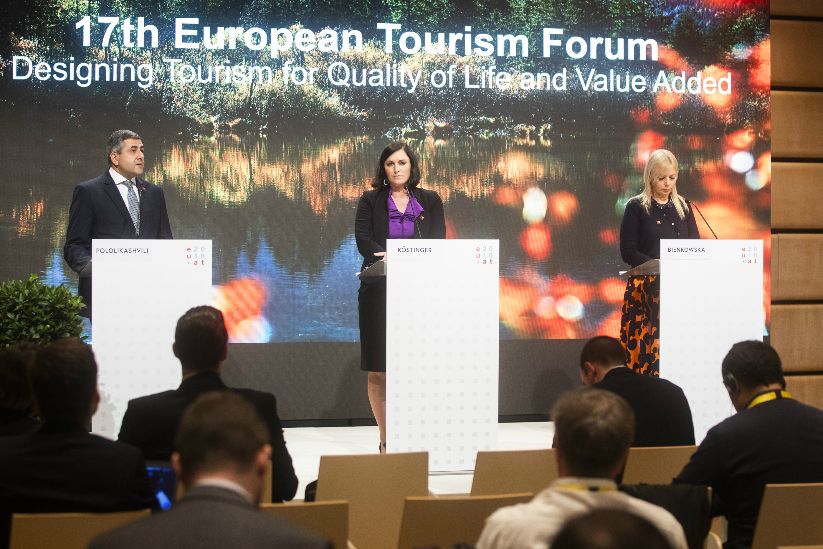
Federal Minister Köstinger: EU tourism summit focuses on strategies for sustainable tourism development
Host country Austria in favour of Europe-wide exchange and cooperation
The 17th European Tourism Forum (ETF) is being held on 1 and 2 October 2018 in Vienna and is co‑organised by the Austrian Presidency of the Council of the European Union and the European Commission. Upon invitation by tourism minister Elisabeth Köstinger, more than 200 renowned figures from all EU member states, including EU Commissioner Elżbieta Bieńkowska and Secretary-General of the UN World Tourism Organization (UNWTO), Zurab Pololikashvili, are participating in the conference.
“During these two days, Vienna is the centre of tourism in Europe. The event starts with a political summit with the Secretary-General of the UNWTO and the responsible EU Commissioner; after that, international trends will be broadly discussed in the framework of the ETF and attendees will analyse how to implement successful strategic planning to meet the diverse challenges. In a global context, the economic importance of the tourism industry is enormous. In 2017, a total of 1.3 billion cross‑border arrivals and 1 340 billion dollars of world‑wide revenues were recorded”,
tourism minister Köstinger underlined.
This year’s forum is dedicated to a key question: how can we create a sustainable future form of tourism that ensures quality of life and value added in the long run. In light of the global growth of tourism and megatrends such as technological development, demographic change, new travel patterns and the need for resource efficiency, strategic planning is gaining in importance.
“With over 500 million international tourists arriving to the EU last year, the tourism sector is performing well and provides an important contribution to our economy. But for the sector to remain competitive, we must not disregard the challenges and megatrends which are likely to shape EU tourism in the long term. We must be ready to transform them into opportunities for the future. To this end, cooperation between stakeholders at all levels is crucial. We need strategic public‑private partnerships and comprehensive tourism strategies to ensure long lasting benefits for the EU economy and local communities”,
emphasised EU Commissioner Elżbieta Bieńkowska.
During the opening of the ETF, Secretary-General of the UNWTO, Zurab Pololikashvili, pointed to the strong growth of tourism in Europe:
“International tourist arrivals to Europe grew by 7% in the first 4 months of 2018, above the global average of 6% and cementing the region’s position as a tourism powerhouse. Austria, which welcomed 30 million arrivals in 2017, has shown steady tourism growth and is a leading promoter of sustainable and responsible travel at its world‑class natural and cultural heritage sites.”
Trends – What is the future?
Tourism plays a vital part in Austria’s economy.
“Annually, about 45 million arrivals are recorded in Austria and our guests spend more than 43 billion euros in our country. This is of fundamental importance to our economy and to the labour market”,
Köstinger said. The preconditions of this success – not only in Austria but throughout Europe – are intact natural landscapes, historical cities, excellent quality and outstanding hospitality. In addition, another aspect has become increasingly more importantin recent years:
"The safety which Europe can offer its guests is gaining in significance. Figures clearly show that in Turkey, Egypt, Tunisia and some other countries tourism collapsed as guests did not feel sufficiently safe”,
Köstinger said.
High-level discussion forum
On 2 October distinguished figures will discuss the implications of current trends for strategic planning.
The first panel will be dedicated to key challenges and comprise Ana Mendes Godinho, Secretary of State for Tourism from Portugal, Anna Athanasopoulou, Head of Tourism in the European Commission, representatives from European associations of employers and employees, HOTREC President Susanne Kraus‑Winkler and Kerstin Howald, head of tourism in the trade union association EFFAT as well as Boštjan Brumen, tourism representative of the EU Smart Specialization Platform for Industrial Modernisation.
The second panel will discuss processes, cooperation and networks necessary for the successful implementation of strategies. The panellists will include Alain Dupeyras, Head of the Regional Development and Tourism Division of the OECD, as well as representatives of thematic and regional co‑operation projects: Nina Forsell for the cross‑border project “Visit Arctic Europe”, Laurent Queige for the project “Paris: la ville augmentée” including the Welcome City Lab Paris, as well as Walter Haas for the cluster “Alpine Health Tourism for Regional Innovation”.
The conference can be followed via a live stream. Access, programme and further information on the event and the speakers can be found on the event page.
Federal Ministry for Sustainability and Tourism
Spokesperson for the Federal Minister
Daniel Kosak
+43 1 71100 - 606918
daniel.kosak@bmnt.gv.at